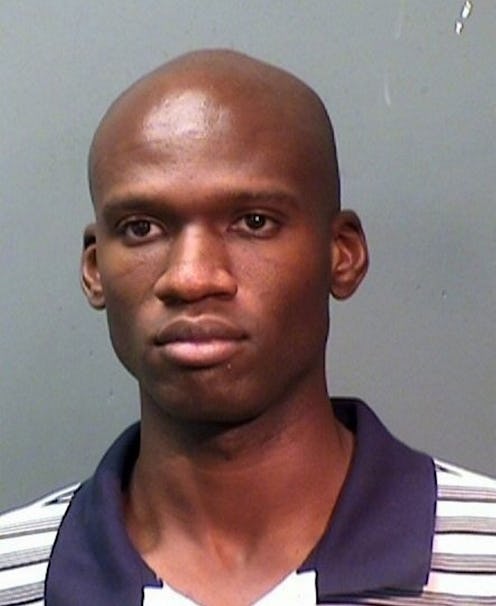News
Does Shooter Aaron Alexis' Race Matter?

On Monday morning, ex-Navy reserve Aaron Alexis used his temp-job ID badge to enter the Navy's administrative headquarters in Washington, D.C.'s Navy Yard; a sprawling site that holds 3,000 employees. Alexis entered the base and started firing a shotgun, apparently at random. He killed 12 people and injured more than a dozen more, before being killed himself in a shoot-out with authorities.
Just after 3 p.m., the FBI released a photograph of Alexis: the 34-year-old New York native is black, which is a distinction that separates Alexis from the vast majority of what we term "mass shooters."
As leading researchers told the Washington Post in March: "Nearly all of the mass shootings in this country in recent years have been committed by white men and boys." Still, though, the debates and blame that tends to follow these tragedies typically centers on issues like gun control and mental-health policies, rather than race. But if the nation has learned anything from the visceral, passionate uproar that followed the death of Trayvon Martin, it's that when a black man is either victim or suspect, race will likely be a central part of the conversation.
Did gun control and mental health advocates on both sides use the shooting as an excuse to plead their cases once more? Yes. Did the media scramble to find out everything they could about Alexis, thus turning him into a dark celebrity of sorts, à la Dzhokhar Tsarnaev? Yes. What was different was the reaction of some conservatives, who used Alexis' race as an excuse to give a giant middle finger to President Obama:
What, Obama is going to react to local news, again? "If I had a son, he would have looked and acted like Aaron Alexis."— Elizabeth Nelson (@ElizabethNels0n) September 16, 2013
You'll remember that the President royally pissed off conservatives when he commented on the death of Trayvon Martin: "If I had a son, he'd look like Trayvon."
What to expect now.. The #NRA will be blamed, the #Navy will be blamed.. #Obama will NOT say if he had a son he would look like the shooter.— Joe Pags - Official (@JoeTalkShow) September 16, 2013
#OpenMikeAtObamasSpeech "If I had a son he'd look like Aaron Al....... wait ..., you're say'n he's the shooter.....? Never mind." #tcot— Tom T. (@VRWCTexan) September 16, 2013
These commentators don't speak for the entire Right — nor the NRA, who enforced their typical "social media blackout," as they do in the wake of each mass shooting — but they do speak to the fact that the conversation is certainly different when a shooter is a black male.
The same researchers who pointed out that mass shooting is largely a white male phenomenon have also suggested that "If African American men and boys were committing mass shootings month after month, year after year... Articles and interviews would flood the media, and we’d have political debates demanding that African Americans be 'held accountable.'"
When conservatives used yesterday's tragedy as a punchline, suggesting they're not surprised that Monday's perpetrator was black (even though, statistically, it is surprising) they're giving credence to the point that the rules are in fact different for black men.
Think that it's just conservatives who view crime in black and white? As the Daily Beast points out :
In one such test (PDF), researchers found that black males elicited the most negative reactions from white subjects—simply seeing them was enough to make participants feel uncomfortable. And in a 2009 survey on the question of blacks and violence, drawn from a nationally representative sample of white Americans, more than 30 percent said that blacks were more violent than whites. More than 40 percent said that “many” or “almost all” black men were violent, compared to less than 20 percent who said the same of black women or white men, and less than 10 percent who said the same of white women.
Fear of black men has a tremendous hold on the American subconscious, and it mixes with our perceptions in ways that guarantee tragedy. As a nation, it’s one of our deadliest problems, and I’m not sure we can fix it.
If America is less shocked by Monday's tragedy — in spite of the statistical evidence proving that Alexis was a huge anomaly — then does that suggest that mass shootings have for the most part lost the capacity to shock entirely?
Since 2006, there have been 25 mass shootings, and only a handful of those have been in the headlines for an extended period. Similarly, only a handful have even prompted a presidential speech, though the issue has been one of the greatest challenges facing the Obama presidency.
Though the president commented yesterday, offering his sympathies to the families of the victims and commemorating those who were injured or killed while working for their country, the press conference wasn't set up because of what occurred in Navy Yard. The president spoke out the incident (and, afterwards, Syria) only as an introduction to his main focus that day: the state of the economy, which took up the next 26 minutes of the speech. (The comments on Navy Yard took two.)
And what of the great majority of the other mass shootings, which are only mentioned in passing by the White House? If the administration doesn't see fit to comment on more "minor" mass shootings, then the message is clear: they aren't shocked, so we shouldn't be either.